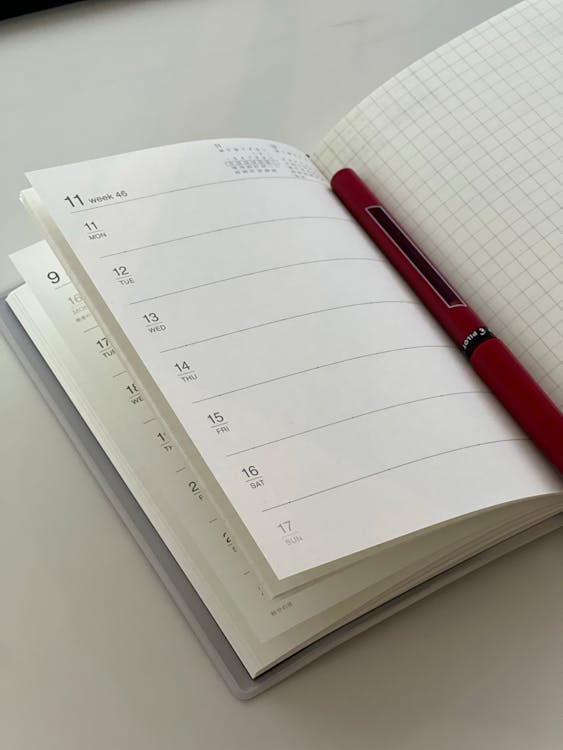*This post may contain affiliate links. That means I may earn a small commission from qualifying purchases or sign-ups at certainly no additional cost to you! Thanks!*
Ever feel like your schedule is running you instead of the other way around?
Trust me, I’ve been there—juggling blogging, teaching, family time, and church activities, all while trying to keep a healthy lifestyle.
Busy, busy, busy! Do you relate to this, too?
And like me, do you experience analysis-paralysis because of all the tasks piling up?
Oh boy, just imagining the activities for the next days and weeks gets me overwhelmed pretty quickly.
It feels like there’s too much tasks, but very little time.
But thankfully, I found a simple system, along with some awesome habits, that can keep the chaos at bay!
In this post, I’m sharing practical tips that have worked wonders for me. This can help you keep your days, weeks, and months running smoothly without feeling overwhelmed.
Let’s dive into how you can take control of your schedule and find that much-needed balance!
How to Organize Your Month, Week, and Day

1. Be realistic about your boundaries.
Be realistic with your schedules and don’t be too optimistic with squeezing in 3-5 major plans in a day.
Calculate your energy, social battery, money, and of course, your time.
Ask yourself: “Can I truly fit all these commitments into one day?”
Don’t bite more than you can chew.
I’ve been the optimistic fella in my younger days, too, and said yes to many schedule and project. I was greedy about garnering achievements.
But surprise, surprise, instead of accomplishing my tasks, I completed nothing, lacked focus, got so pressured, and lost my motivation.
In short, I gave up.
See, overloading our schedule can quickly lead to burnout, so it’s necessary to really understand your realistic capacity and boundaries.
Avoid the trap of unnecessary multitasking.
Contrary to popular belief, multitasking (the major tasks) often dilutes our productivity.
Being realistic will ensure you don’t set yourself up for frustration later!
2. Always keep a checklist.
Ever since I became more serious and resilient with life, which was in my mid-20s, I acquired the habit of creating checklists—starting with the monthly, then weekly, and finally daily.
If we want to organize our life, it starts with organizing how we spend our time, right?
Here’s how I do it:
First Step for Organization: Monthly Schedule
For the monthly schedule, we include here the big stuff that rarely changes schedules.
What are the big things in your life right now?
For me, these are:
- writing online (my main job)
- teaching at a high school (I do it part-time)
- family time
- church activities (on the weekends!)
- and general home cleaning day
These non-negotiables form the structure of my month. They’re set in stone.
I write these schedules on my calendar and tape them on my wall so I won’t lose track of my activities despite the busyness.
Moreover, don’t forget to schedule your preparations.
Preparation days are nonnegotiables, too.
Truly, a successful day usually starts with the preparations that happened days before.
So, make sure to allot a day/time for that—whether it’s gathering materials, practicing, reviewing, exercising, marinating dishes, trying on outfits, or whatever kind of preparation it is.
For example, I only work at school every Friday, but I allot my Thursdays to prepare my two-week lesson plans.
This way, I can avoid cramming and even save myself from needless anxiety.
Don’t have a calendar yet? Check the magnetic calendar below!
Useful Amazon Finds: Magnetic Calendar Your Fridge

Second Step for Organization: Weekly Schedule
Now, here comes my weekly checklist. This is where we get more specific about the non-negotiables.
Different week asks for different requirements.
Let’s discuss my teaching job again.
Although my teaching job is set in stone every Friday, lessons change, and so do the materials I need for the class.
Sometimes, I need some PowerPoint visual aids for theoretical topics. Well, I can just sit at home and make one!
But other times, I need triangle rulers to teach actual drafting, so I schedule my Thursday night to go to the store for some school supplies.
How will your week go? Again, allot a time or day for preparations. As simple as that.
This week is your priority.
Don’t look too far ahead in the next weeks.
This week is your priority. No, not next week, not next month. THIS WEEK!

Third Step for Organization: Daily Checklist
Then, there’s the daily checklist, where it’s all about execution.
I assume you’ve already prepped because you successfully scheduled your week.
So now it’s time to get things done. It’s not called a to do list for nothing!
For my daily checklist, I often go to my Notes app and type in the tasks for the day. Some are permanent schedules, others are spontaneous errands and reminders I suddenly remembered.
For example, I would jot down my daily tasks like this:
- “church day”
- “bring the invitation cards”
- “talk to Abie about [topic]”
- “pick up the malong I borrowed”
- “buy soap and shampoo”
- “jog at 5 PM”
- or “remind friends about the group date.”
These may seem small, but they can slip through the cracks if they’re not written down.
Plus, crossing off items on your list gives you that satisfying sense of accomplishment!
This keeps you on track and reduces the chances of forgetting anything important.
You can write it on a notepad that you always bring with you, or just keep them written on your phone.

3. Prep and iron your clothes on the weekend.
Ugh, mornings are pretty hectic. Gets worse when you can’t figure out an attire.
What I do now? Just recently, I started prepping my clothes on the weekend. I plan for the whole week; a quick iron will do, too.
Look at your monthly and weekly schedule—do you have any big meetings, events, or casual days?
It might seem like a small task, but it can save you a lot of time and mental energy.
No more chaotic mornings and unkempt wardrobe!
4. The night before, prepare the materials you need for tomorrow.
The night before plays a huge role in organizing your schedule.
I used to spend my nights scrolling through social media or playing mobile games. With that, every morning felt like a chaotic race to get out the door.
But once I switched things up and started prepping for the next day at night, my mornings became so much smoother.
At night, I take out my ironed clothes, the shoes I’d wear for tomorrow, and load my bag with my essentials, so I already have everything laid out.
No stress in the morning and no more rushed breakfasts. Just some peaceful minutes before the day kicks in.
5. Set a day for general cleaning.
To have a peaceful day, tidying up our homes is a must.
Well, how can we even call it “being organized” when our home’s a mess?
Do a general cleaning day at least every week.
Most people clean on the weekend.
However, with my flexible work schedule, my general cleaning days usually fall on Mondays or Wednesdays.
Not that this day/time should be dedicated getting your home in order.
When your home is clean, you’ll feel more productive, more focused, and less stressed.
Moreover, with my (possible) ADHD, I surely cleared the distractions out!
6. Set alarms and timers.
I’m just human, and I wee bit struggle remembering that I even have a checklist. Lol.
Fortunately, that’s where my trusty alarms come in handy!
I set alarms on my calendar to give me a heads-up about upcoming events, bills, or appointments.
I also have weekly and daily alarms with labels like “Pinterest!” every Saturday or “stand up and stretch!” every day at 10 AM.
These alarms help me stick to my weekly routine and give me a little nudge to stay active and productive.
And then, there’s my daily timer—my secret weapon for staying focused. I set timers for cooking, writing, and any task that might drag on longer than it should.
This keeps me from getting stuck or losing track of time.
Useful Amazon Finds: Echo Dot for Timers, Alarms, and Reminders!

7. Schedule a day off.
You can’t keep grinding week after week without giving yourself a break.
If you want to avoid burnout, rest is non-negotiable. During this day, you do no work, cleaning, or strenuous activities—just pure relaxation. Or some bonding with your family.
I sometimes call this “scheduled procrastination.”
They’re intentional and purposeful!
While some can work all week, someone like me (who’s easily fatigued) needs adequate time to recharge, both mentally and physically.
Resting is just as important as all the tasks on your to-do list.
This is if we want to survive in the long run and not be eaten alive by burnout.
8. Focus on the now.
I know, I know. Life can feel overwhelming, especially when you’re juggling multiple responsibilities.
Honestly, I had times when I broke down while trying to complete my lesson plan, prepare to jog, and plan my next article simultaneously.
And spoiler alert: I gained NOTHING that day, except for a headache.
Oh, how I loathe this distracted mind of mine sometimes.
To avoid this mistake, I encourage you to commit your time to one major daily task.
If today is all about lesson planning, then that’s the only thing I will focus on.
Trust me, unnecessary multitasking will often leave major tasks unaccomplished. Well, unless you’re superhuman!
As an overthinker, this shift in mindset where I dropped other tasks to focus on one changed me for the better.
I’ve learned to live in the moment, too, and let tomorrow’s problems stay in tomorrow. That’s the whole point of this topic.
Since we have our tasks organized for the whole month, week, and day, rest assured that everything has their time and season.
So just focus on the NOW and DO NOT unnecessarily multitask!
Conclusion
Staying organized isn’t about perfecting every list. I admit I don’t follow my calendar and checklist 100%, but hey, I won’t batter myself for missing a schedule at times.
The tips I shared above are simply a system you can follow to manage your time and responsibilities one by one.
Give yourself room to breathe. Stay present in the moment, and don’t hesitate to adjust your plans when needed.
I’m sharing this because this is how my days played out successfully, even for a distracted fella like me!
With a little planning and a lot of patience, you can lead a more organized and stress-free life—one day at a time!
That’s it! Thanks for reading! 🙂

You may also like:

